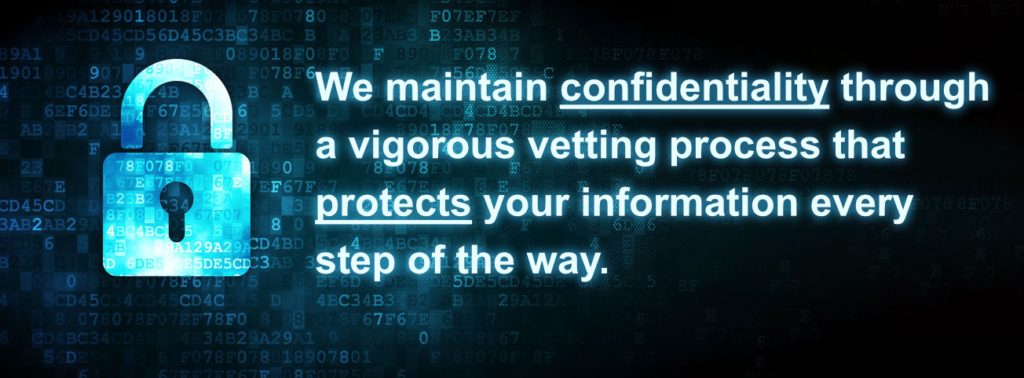As a business broker specializing in the sale of manufacturing companies, one of the questions most often asked by potential clients is how my firm can maintain confidentiality while selling a business and what security procedures we have in place to protect our clients.
For most small to mid-size manufacturing companies, the disclosure that the business is for sale to customers, competitors or employees could potentially cause devastating harm to the business. At Accelerated Manufacturing Brokers, Inc. we have procedures that are different than most mergers and acquisition firms to alleviate this concern.

What Most Brokers Do Wrong to Maintain Confidentiality

Anyone responding to a blind teaser or a marketing piece, with over 99% of the brokerage firms in the country, is required to sign an NDA (Non-Disclosure Agreement). Once they do, they are given an Offering Memorandum, or CIM (Confidential Information Memorandum), as most in the industry call it. The problem here is that there is nothing confidential about it. Normally the name and address of the client is clearly spelled out in this document. The disclosure of this information is usually provided without vetting who the buyer is and whether or not they are qualified both financially and professionally.
Why Accelerated Is Different

Let’s talk about what we do differently to maintain confidentiality. At Accelerated, anyone responding to a teaser, or any type of advertisement is, of course, required to sign an NDA. It’s what we do after that which makes the difference. We have a department in charge of vetting buyers. Is the person filling out the NDA a real person? Is the address a real address and can we connect this person to it? If the potential buyer claims to work for a certain company, can we connect them to that company? In this day and age, no one is invisible. If we can’t find out who the inquirer is, we may ask for more information, but most times that’s the end of the road. It is typical that we vet between 150-250 potential candidates for each one of our listings. Usually, less than 10 are permitted to know who our client is.
Buyer Work History Vetting
At this stage, we’ve usually discovered a person’s work history, and much more. While some manufacturing companies can be sold to someone with management or business development experience, others require specific know-how or the company’s continuity could be at risk. Our promise to our clients is that if we’re bringing someone to meet them, we know for sure that the person is professionally and financially qualified. If the person is not a professional fit, they can’t move forward to the next stage, thereby continuing to maintain confidentiality.
What Information is Disclosed
If we’ve identified whom we’re dealing with after receiving an NDA, the potential buyer will get our Offering Memorandum or PitchBook. Our book, however, does not identify who or where our client is. For location, we may use terms like New England, or Southeast based. If even the region would disclose who our client is because they’re in such a niche market, we won’t use a region in our description, but rather state, “U.S. based.” Our books are designed to answer most questions that a quality buyer will have including things like:
- Gross Margin
- Customer concentration (without disclosing names)
- Sector concentration
- High-level sales and EBITDA for a 3-year period
- Major markets served
- Overview of facility size
- Size of staff
- Types of sales and marketing efforts used
- Industry benchmarks vs. client company
Financial Ability to Close the Transaction
If after reviewing the Offering Memorandum the potential buyer has continued interest, to maintain confidentiality, the next level of vetting occurs. How are they going to pay for the acquisition? A potential buyer must show evidence of their financial ability to close the transaction, or they NEVER get to know who our client is. If they are financing the deal, they must show evidence of an appropriate down payment and their creditworthiness. Often, we’ll force the buyer to get pre-approved by one of the national lenders we work with. At this stage we know if someone is a professional fit AND that they are financially qualified. Then and only then is a potential buyer allowed to meet with an Accelerated client and receive confidential information like redacted client financials.We’ve been told many times that our procedures are different and stricter than any other broker. They are, and that is by design.
A Word About Dealing With Competitors
If we discover during the NDA process that we’re dealing with a competitor, an extra layer of precaution is put in place. Many manufacturing business owners think the best buyer for their business is a large competitor. This is not necessarily true. Larger companies often have their facilities, machine tools and staff set up for their existing business. They may just want your customers. If that’s the case, they are likely not the best buyer for you because they’re not going to pay for what they do not need. However, there may be much larger companies seeking to expand geographically, or a synergistic buyer who has complimentary services to yours; in which case they might be a good candidate. Any time we’re dealing with a competitor, our client is alerted to the inquiry and a discussion ensues on whether or not it makes sense to proceed. With competitors, the release of certain types of confidential information, even after an offer has been made, may need to be different for the protection of our client. The bottom line is that we think of our client’s protection at every stage of the transaction. Our procedures are designed to maintain confidentiality throughout the process.
Conclusion
Do This Before Hiring a Broker
If you are a manufacturing business owner considering selling, I’d urge you to test what I’ve talked about here. Hop onto multiple listing sites like www.BizBuySell.com or www.BizQuest.com, find a manufacturing company for sale and contact the broker. If they freely provide information about their clients without fully vetting you, they’ll do the same if they’re selling your business. Can you afford for that to happen? The sale of manufacturing company presents challenges not found in other sectors. Make sure you enlist the help of a specialist and that you fully understand and agree with their procedures before engaging them. Contact us to schedule a confidential call. Topic: How to Sell Your Manufacturing Business – (The Definitive Guide)

